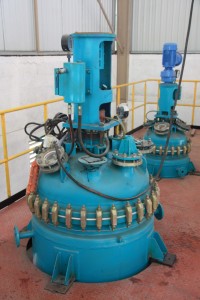LAUGFS and SLINTEC prepare for new ‘sugar’ of the future
View(s):Titanium dioxide, a substance as old as the earth itself is termed as the new ‘sugar’ (or salt) of the future by many scientists. It’s making waves in Sri Lanka as well – more so because LAUGFS Holdings has started a joint venture with Sri Lanka Institute of Nano Technology to add value to local Ilmenite and produce titanium dioxide (TiO2).
The Rs. 60 million sleek factory at Nano Park in Homagama, now under installation will be commissioned by end August, Dinithi Kodituwakku, Research and Development (R&D) Engineer Sri Lanka Institute of Nanotechnology (SLINTEC) told the Business Times. Explaining the process, she said that this plant, which is a pilot plant, churns 2 kilogrammes of TiO2 per day. They are aiming at 60 kilos monthly.
Perfect white
Titanium dioxide has a variety of uses, as it is odourless and absorbent. In paint, it is often referred to casually as “the perfect white”, “the whitest white”, or other similar terms. This is the pilot plant, before commissioning the industrial scale plant in Pulmudai in two year’s time, Ms. Kodituwakku said. “We’re producing high quality materials, adding value to them. This will substitute imports in these raw material for products such as paints.”
Nadeeshan Jayakody, R&D Engineer, SLINTEC joining in the discussion said that local Ilmenite has more TiO2 than in any other country. He said that the country exports 40,000 Metric Tonnes (MT) annually. “TiO2 is an effective opacifier (a substance added to a material in order to make the ensuing system opaque) in powder form, where it is used as a pigment to provide whiteness and opacity to products such as paints, coatings, plastics, papers, inks, foods, medicines (i.e. pills and tablets) as well as most toothpastes,” he said.
He added that testing and optimization will be carried out in this plant at Homagama when the industrial plant in Pulmudai is commissioned.
Import substitution is on their mind with TiO2 that they aim to produce on a large scale. “By mid this month this plant will be fully operational,” he said, adding that they’ll be designing the Pulmudai plant by next year.
“We import 3,000 Metric Tonne (MT) of TiO2 annually as raw material from , China and Australia. One MT costs US$250 and import substitution will do the country immense good,” Mr. Jayakody said. He added that the plan is to substitute importing this entire amount.
TiO2 is one of the top 50 chemicals produced worldwide. As technology has advanced, so has its ability to take normal sized particles of minerals and reduce them to sizes never before imagined. This is where Nano Ti O2 comes in.
Niche industry
Gayal Rangejeewa, Design Engineer SLINTEC noted that in the future they are aiming at converting the TiO2 to Nano Ti O2 in the industrial scale plant in Pulmudai. In cosmetic and skin care products, Nano Ti O2 is used as a pigment, sunscreen and a thickener. “It is also used as a tattoo pigment and in styptic pencils (a short piece of an anti-hemorrhagic compound that stops bleeding from small cuts). Titanium dioxide is produced in varying particle sizes, oil and water dispersible, and in certain grades for the cosmetic industry,” Ms. Kodituwakku added.
Nano Titanium dioxide is found in almost every sunscreen with a physical blocker because of its high refractive index, its strong UV light sucking ability and its resistance to discolouration under ultraviolet light, she said. This advantage enhances its stability and ability to protect the skin from ultraviolet light.
Nano TiO2 is a significant niche industry and demand for these materials is strong, according to the engineers. According to research, 50, 400 Tonne of Nano TiO2 was produced in 2010, representing 0.7 per cent of the overall TiO2 market. By 2015, production is projected to increase to 201,500 Tonnes.
Follow @timesonlinelk
comments powered by Disqus


